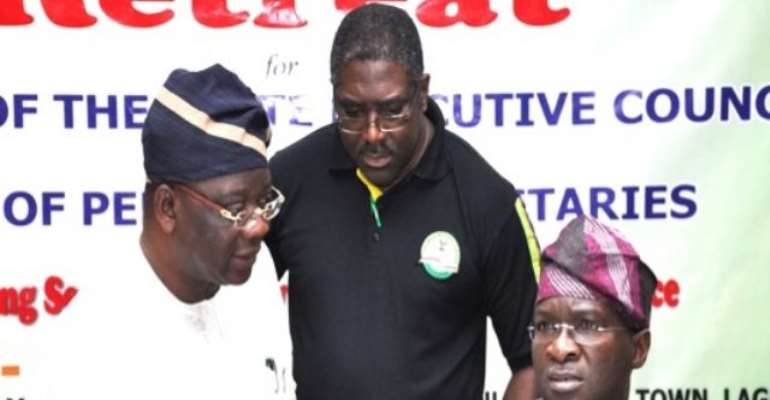Lagos Writes FG, Seeks Takeover Of Power Distribution Companies

LAGOS, July 11, (THEWILL) - Lagos State Government has identified that the solution to power shortage in the country not only lies in the building of more power plants, but in the proper management of the power distribution companies and the distribution assets.
Governor Babatunde Raji Fashola (SAN) spoke in an interview with journalists at the weekend at the State Executive Council and Permanent Secretaries retreat held in Lagos.
At the retreat, Fashola said the state has written to the federal government to allow it take over the assets of the two distribution companies located in Lagos namely the Eko Distribution Company and the Ikeja Distribution Company in partnership with the people who have indicated interest to use private sector funding and capacity to manage it.
According to him, as long as the Federal Government fails to articulate its intention in the power sector, no one will come forward with his money to invest. Until there is efficiency in the distribution end of the power chain, nobody is going to bring money into the power sector.
He said: "We did it with the telecom companies. Immediately the telecom companies got their licenses, they rolled out their mast and repeater stations, they issued bills and collected their money and continued to invest in infrastructure that kept the system going," Fashola said.
The governor explained that the National Assembly has passed the law on power sector reforms with all that remains being for the Executive Council to complete the process by telling Nigerians what the roadmap to implementation would look like.
Fashola quickly recalled that he has met several people in the last three years who
"have indicated interest in coming to invest in the power sector, but want a clear roadmap before doing so. The people who did it then are still available.
"It is not enough to say we are going to privatize. What is the roadmap? The decision is not clear to us here in Nigeria and it has to be clear to us here in Nigeria before we can send it outside."
"They have done this in Uganda in three years, they have powered 275,000 homes, the people who did it are ready to work with us but they need a clear roadmap. All we need now is the injection of capital and managerial skills and we are ready to go," he said.
Fashola also said the focus has been on an assessment of what the present government has been doing on a yearly basis and a daily basis and its impact on the people.
He explained that in many African countries, budget implementation and the ability to measure its impact on the people has always been a problem, adding however, that in the last three years, Lagos State has recorded increase in its budget performance on a yearly basis as it continues to re-invent itself.
Fashola said the present government is now engaging in quarterly budget assessment where it is monitoring projects not only being completed but moving a notch higher by trying to measure the impact which the projects have on the citizenry.
He said: "Where we build a new road, we want to know if the new road has helped improved transportation. What is the turnaround time of transportation at peak periods and off peak periods? We also want to know if it has helped raise the standard of living.
"In an area where we have built a park or cleared the drains, we want to know if it has improved healthcare or the standard of living there. How does that translate to a longer life expectancy for the people? Where we build school, has it impacted on the people? How many students are now in the classrooms? How can we improve the student to teacher ratio," he said.
Fashola also said through this the administration is assessing itself and redefining the parameters of the work that is being done in the public service, adding that Lagos is the first sub-national government that is engaging in that in Africa, adding that specifically all of this can help service delivery across sectors like housing, security, job creation education and healthcare.
"We listened to the Health sector report yesterday. They have screened over 480,000 people for diabetes and hypertension. We are also doing malaria indoor residual spray in a bid to put an end to malaria instead of just buying nets and drugs, we want to attack malaria. Those countries that have eradicated malaria did not do anything that we cannot do."
"We are already developing an Insurance Scheme for communities, with Ikosi-Isheri people already paying N800 to get basic support for immunization, treatment for diarrhea and all of that in a self insurance system that is being expanded to other communities," the governor added.
